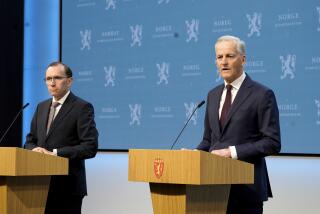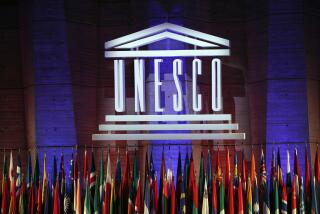U.S. Noncommittal on Recognizing Croatia, Slovenia : Diplomacy: It faces the dilemma of standing by principle or yielding to reality on breakaway republics.
- Share via
WASHINGTON — The Bush Administration remained conspicuously noncommittal toward Croatia on Tuesday in the face of the European Community’s decision to recognize breakaway Yugoslav republics in January, a move that presents Washington with the difficult choice of standing by principle or giving way to reality.
The State Department greeted the EC’s declaration by welcoming the month of breathing space before the EC accepts Croatia and Slovenia as independent states.
State Department spokesman Richard Boucher said the delay “will allow more time” for U.N. Secretary General Javier Perez de Cuellar and Britain’s Lord Carrington, the EC’s designated Yugoslav mediator, to seek yet another truce, acceptance of U.N. peacekeepers and a political settlement.
But a White House official said the Administration remains concerned about “the negative effects of recognition” of the two break-away republics by the EC, possibly on Jan. 15.
“We haven’t decided whether we’ll go along with them (the EC) when the time comes,” the official said.
The EC and the United States have insisted that new nations meet certain criteria, such as respect for frontiers and human rights, before they will extend recognition--criteria that many officials believe Croatia and Slovenia have not met.
The Administration is sympathetic to the frustrations of Germany and other EC members who want to recognize the two republics and who argue that to do so might help halt the aggressive actions of Serbia. But it fears that recognition will intensify the violence and spread the conflict to other parts of Yugoslavia and beyond, as Croatia gets new arms and as Serbia and the Serb-dominated federal army turn in frustration on Bosnia-Herzegovina and Macedonia, a senior official said.
Albania and Bulgaria--and Turkey and Greece--could easily be pulled into the wider disputes, an Administration official said, as the present conflict between largely Roman Catholic Croatia and mainly Eastern Orthodox Serbia begins to involve Yugoslavia’s Muslims, including those who still look to Turkey for protection.
The Administration also fears that recognition will make a shambles of the broader principles that the United States and the EC have set as conditions for recognizing the independence of an East European state or a Soviet republic such as Ukraine. These include democratic self-determination without use of force, observance of existing internal and external borders, respect for human and minority rights and acceptance by the new states of the treaty obligations of their predecessor nations.
Ukraine has met, or is now meeting, these conditions, and its “earned recognition” by the United States is virtually assured, officials have indicated.
But Croatia’s efforts to leave Yugoslavia have been far from peaceful, with thousands having been killed since its June declaration of independence, the officials noted. Also, there is doubt about the commitment of Croatian President Franjo Tudjman to democracy and to protecting the Serbian minority within his republic.
If the United States now refuses to join the 12-nation EC in recognizing Croatia and Slovenia, the Administration will break its pattern of following the EC’s lead on the Balkans and destroy the valued unity with which the West has dealt with Eastern Europe and the Soviet Union.
It would also place the United States in direct opposition to the new Germany, which, in leading the drive for recognition of Croatia and Slovenia, is flexing its political muscle, U.S. officials admit.
Despite its predicament, the United States maintains its continuing solidarity with the Europeans. “We continue to place a high value on the European Community’s leading role in seeking a political settlement of the Yugoslav crisis,” declared Boucher, “. . . and on U.S.-EC political cooperation on this issue.”
But a White House official said that “while we understand the motivation of some EC members, we still think the slower approach would minimize bloodshed.”
More to Read
Sign up for Essential California
The most important California stories and recommendations in your inbox every morning.
You may occasionally receive promotional content from the Los Angeles Times.










